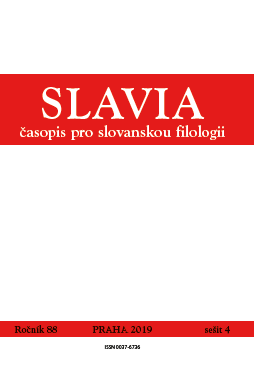Demasculinisation of the Biblical Message
Demasculinisation of the Biblical Message
Polish Equivalents of the Greek Phrase τέκνα τοῦ Θεοῦ ‘Children of God’ in the Renaissance Translations of the New Testament into Polish
Author(s): Tomasz LisowskiSubject(s): Christian Theology and Religion, Polish Literature
Published by: AV ČR - Akademie věd České republiky - Slovanský ústav and Euroslavica
Keywords: Biblical rendering; Greek and Latin source texts; sola Scriptura Protestant doctrine; 16th century Polish; Bible in Polish; gender and the sense of rendering
Summary/Abstract: The phrase τέκνα τοῦ Θεοῦ, literally ‘the children of God’, which is used in the Greek text of the New Testament, gained a theological, soteriological meaning. Its equivalent in the Latin Vulgate is the expression filii Dei. The noun filius used in the plural form filii could mean both ‘sons’ and ‘children’ in the Latin language used in the times of St. Jerome. Polish Renaissance translations of the New Testament can be divided into two groups when it comes to the quality of the equivalents of the phrase τέκνα τοῦ Θεοῦ that they employ. The first group consists of translations that interpret the Greek phrase τέκνα τοῦ Θεοῦ (the Latin filii Dei) as synowie boży ‘sons of God’. The texts include both Catholic translations officially based on the Latin Vulgate as well as Evangelical translations which, in accordance with the sola Scriptura doctrine, were based on the Greek original (Textus Receptus). Because of the semantic property of the Polish equivalent synowie Boży ‘sons of God’, women were excluded as the recipients of the soteriological, biblical message. The Bible interpreted by Jakub Wujek (1599) became the official translation for the Polish Catholic Church for more than 350 years. During that time Polish Catholics received a masculinised biblical message. The second group is comprised of Nontrinitarian translations and the Evangelical Gdańsk Bible (1632) interpreted by Daniel Mikołajewski, who used the Greek original as the source text. Here, the Polish equivalents of the Greek phrase τέκνα τοῦ Θεοῦ are the expressions dzieci boże and dziatki boże ‘children of God’, which adhere to the original meaning. The texts restore the original sense of the biblical message while demasculinising the discussed phrase at the same time. Among these, only the Gdańsk Bible became the canonical translation used in everyday ecclesial or private religious practice by Polish Evangelicals up until the 1970s. Thus, for more than 350 years, the biblical message connected to the analysed phrase – which is an important Christian theological term – was received by Catholics in its semantically masculinised form, and by the Evangelicals in its egalitarian, gender-ambivalent sense.
Journal: Slavia - časopis pro slovanskou filologii
- Issue Year: LXXXVIII/2019
- Issue No: 4
- Page Range: 440-452
- Page Count: 13
- Language: English
- Content File-PDF

